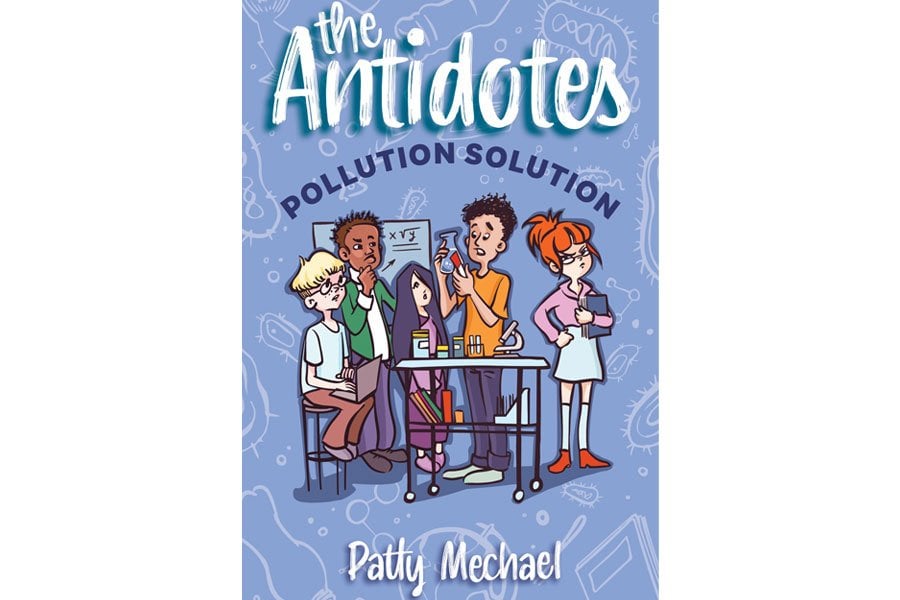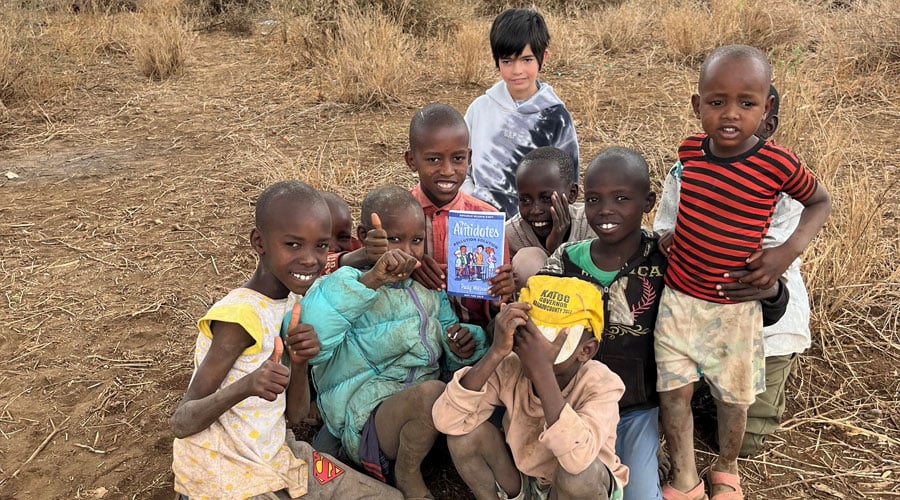LSHTM Graduate writes new children's book with her 10 year old son
10 August 2022 London School of Hygiene & Tropical Medicine London School of Hygiene & Tropical Medicine https://lshtm.ac.uk/themes/custom/lshtm/images/lshtm-logo-black.png
Please tell us about your book and the inspiration behind it.
The Antidotes are here to help save the planet! The first book in this new middle grade series is perfect for curious kids with an interest in science. The Antidotes: Pollution Solution (Bold Story Press, October 4, 2022) showcases a stimulating adventure for kids and touches on returning to normalcy after the global pandemic, the challenges of grief, and co-parenting in an age-friendly way. This engaging STEAM-based story includes a colourful cast of classmates that attempt to save their town from a corporate water polluting experiment gone wrong.
The inspiration for The Antidotes: Pollution Solution came from learning that there was a gap in smart middle grade fiction at the Society of Children’s Writers and Book Illustrators Conference in NY just as the pandemic was starting in 2020, where I was pitching a Young Adult novel that I had started. At first, I thought it would be fun to have a ready-made audience for a middle grade fiction book in my then 8-year-old son, but to my pleasant surprise, Gabriel had lots of ideas and opinions about the story, and so I enlisted his support throughout the process.
At the start of the Covid-19 global pandemic, we talked about how the pandemic might have been different if children were more actively engaged. I drew inspiration from a team of boys aged 10-16, that I had worked with in South Sudan in 1999 to go door to door to map a two-year outbreak of unknown illness that was killing entire households or leaving families with paralyzed loved ones. The World Health Organization and the United States Centers for Disease Control used our maps to quickly identify the disease as Relapsing Fever. The boys then embarked on an education campaign in the schools to get children to teach their families how to prevent and treat the disease. Gabriel and I created the story, The Antidotes, on long walks with our pandemic puppy, Mahfouz, a Westie named after the Egyptian Nobel Prize winning writer, Naguib Mahfouz.
Throughout the pandemic, it’s been shameful how little regard there has been for the impact of the pandemic on children who not only lost momentum on developmental and academic progress, but also lost loved ones and found themselves in unprecedented vulnerability with increased domestic violence and insecurity. My favourite line in The Antidotes came from something Gabriel said when we were brainstorming the book, “No kid would let another kid die if there was something that they could do to prevent it.” There is no shortage of public health issues that need young people’s attention and action now- everything from mental health to unchecked/unregulated technology. They are our greatest potential for social change and global public health. They care about each other.
This summer Gabriel and I had the good fortune to travel around Kenya, where I began my international development career in 1996 as a primary school teacher in Western Kenya. During the trip he was able to share the book with a group of curious Kenyan children. They talked about the pandemic and the book and then played a rousing game of football. It was the highlight of the trip for both of us.
What do you hope to achieve further in the future?
There are an estimated 2.2 billion children in the world today. They often pay the highest price during crises because they aren’t engaged, and few advocates act on their behalf. As the mom of a 10-year-old boy, I am concerned that not enough grownups are taking the important role young people can play in their own lives seriously. My vision is that The Antidotes: Pollution Solution would inspire as many young people as possible throughout the world to be agents of change by applying science, technology, engineering, arts, and math principles to address public health issues, especially those caused by the climate crisis. Gabriel and I are actively working on the second book in the series about youth working together to become more critical users of technology. Stay tuned for future Antidotes books.
How can alumni find your book?
The book will be available in paperback and Kindle on October 4, 2022 and can now be pre-ordered on Amazon.com. If you like it, please consider posting a review and/or recommending it for adoption in your local schools and libraries.
My Career in Public Health
I got into public health because I loved the idea of keeping healthy people healthy and developing policies, systems and approaches to address health issues that impact millions of people at a time. For public health to work, it requires collective action and a sense of community- that for everyone to be healthy/safe all people’s health/safety is important. It’s an altruistic field that requires an all of society approach, including young people.
My career in public health has been largely focused on low- and middle-income countries, mostly Africa, Asia, and the Middle East working on issues ranging from maternal and child health to HIV and AIDs. I did my PhD at LSHTM on mobile phones and health and helped shape the field of mobile health or mHealth and now digital health. Some important roles I have had include, Director of mHealth and Telemedicine at the Earth Institute at Columbia University (2007-2011); Executive Director of the mHealth Alliance (2011-2014); Executive Vice President of the Personal Connected Health Alliance (2016-2018). I am currently the co-founder (since 2014) and executive director (since 2022) at HealthEnabled and technical lead (since 2017) for the Global Digital Health Index and Maturity Model.
I am the co-editor of mHealth in Practice: Mobile technology for health promotion in the developing world published by Bloomsbury, an editorial board member of the Journal of Medical Internet Research, and a regular contributing author to AIMed’s quarterly journal. Accolades include the Rockefeller Foundation’s Bellagio Resident Fellowship, the British Council UK Education Social Impact Award, and the Johns Hopkins University Knowledge for the World Distinguished Alumnus Award. I have a PhD in Public Health and Policy from the London School of Hygiene and Tropical Medicine (2006) and a Master of Health Science in International Health from the Johns Hopkins School of Public Health (1998).
